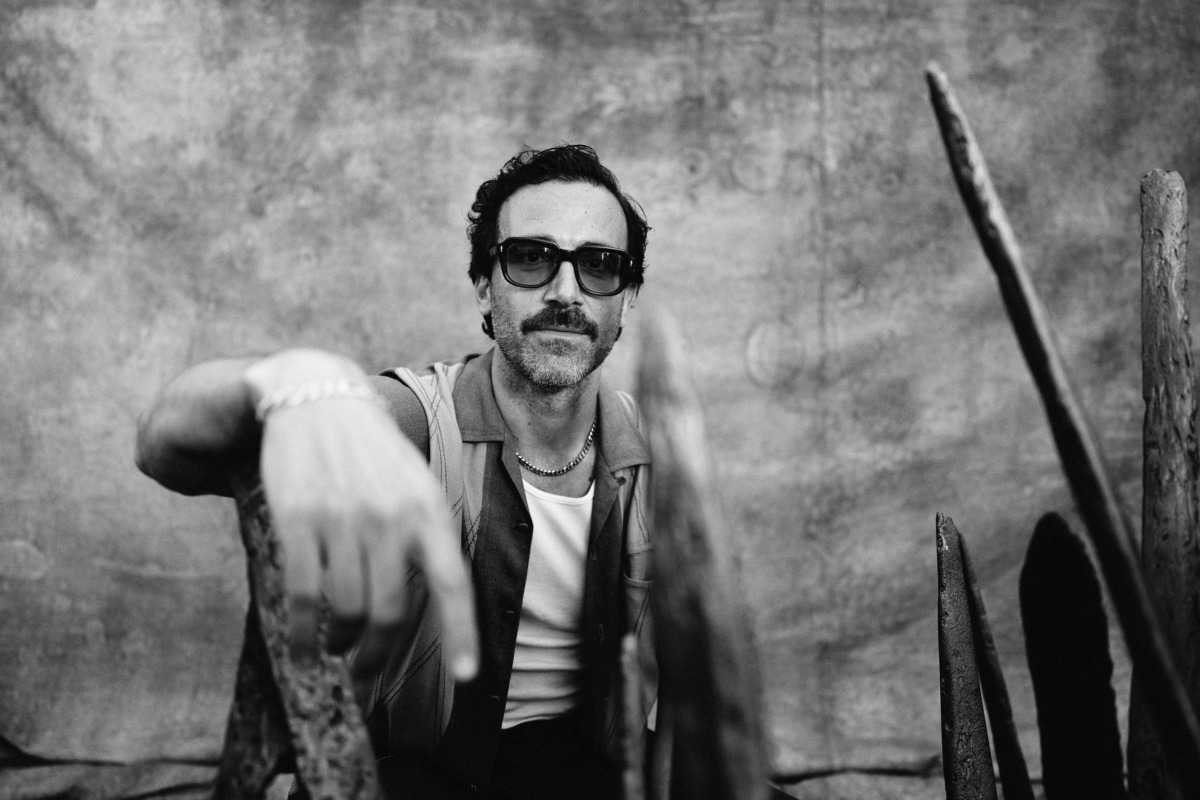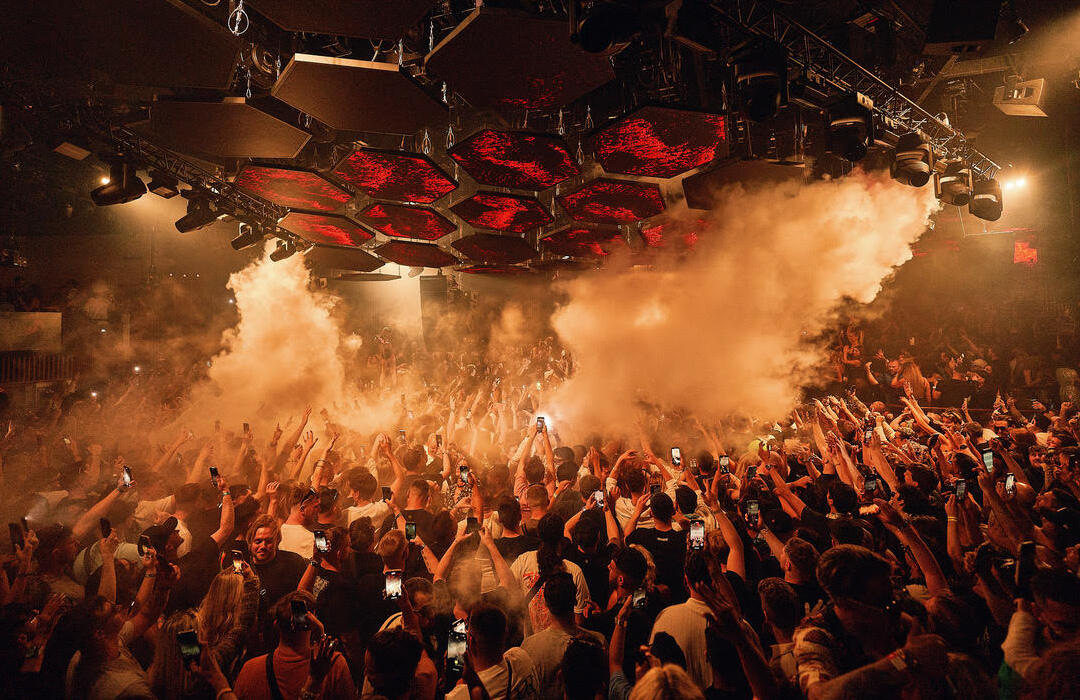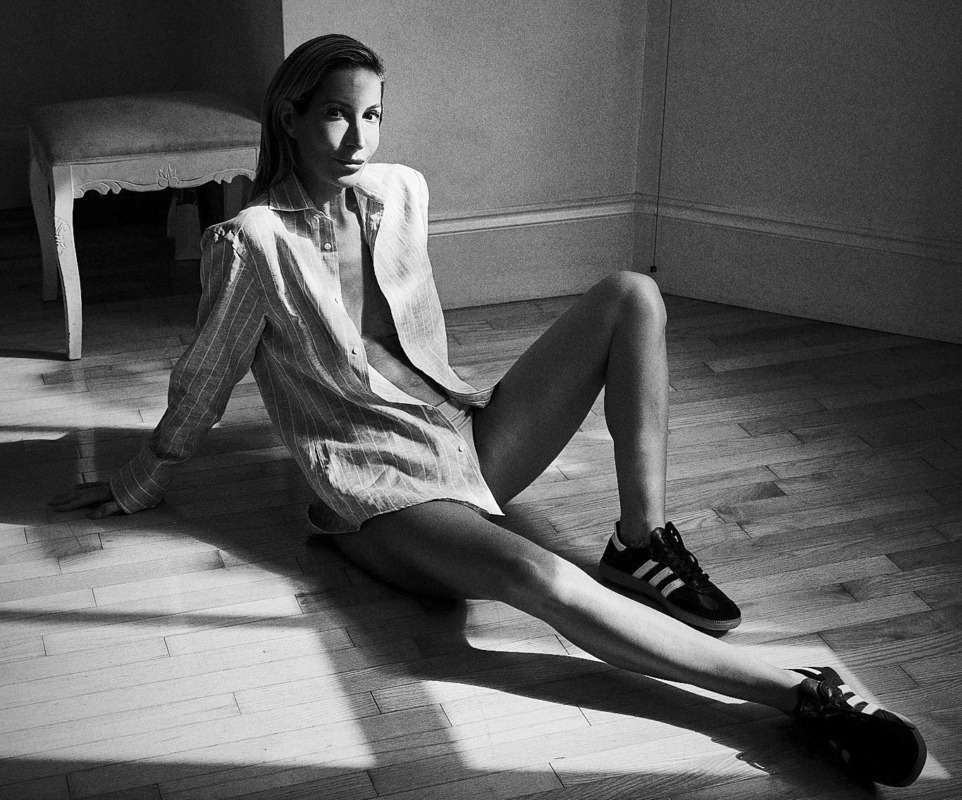Flaunting an online presence of effortless cool, QRTR might not initially seem approachable, but it turns out the warmth in her music is matched by how magnetic she is in person. Regularly described by listeners as "sex music," the Brooklyn-based artist's dynamic productions blur the lines between IDM, ambient, house and experimental club, wrapping you in an aural blanket and injecting passionate convictions through the friction of sultry soundwaves.
But what makes people most drawn to QRTR is how relatable she is. She's insistent on being self-aware, and doesn't shy away from tools to look inward, including astrology, tarot, and even Myers-Briggs. "I minored in child and adolescent mental health at NYU, so I think personality type and behavioral assessments can be really useful for people," she says. "I think it's always good to constantly try to analyze and understand yourself, and it helps you evolve as a person."
Read this next: New York Rising
Even before she was QRTR, Meagan Rodriguez has always been an artist. As a child, she recorded herself singing and dancing. In college, her dreams of being an actor ultimately led to her career in post-production supervision on HBO's Succession. But it was her dad's handed-down love of dance music that stuck with her most through the years.
Now coming up on seven years of the QRTR project, her slow burn rise is starting to ignite, landing her on major festival stages like Firefly, Dirtybird CampINN, and support on Luttrell’s North America tour. Check out her exclusive Impact mix and Q&A below.
Who's your favorite artist outside of dance music?
Warpaint is my all-time favorite band. They're just such an inspiration because they write their lyrics like these little mantras, depending on how they felt at the time. And it won't be this super cohesive story for the outside listener, but [instead] these poetic abstractions of thought. I was listening to the commentary on their self-titled album, and I remember one bandmate saying they sometimes stopped playing songs because the mantra no longer serves them. And I thought that was so beautiful to use the creation of music [as] wrapping up a feeling, a thought, a memory, a moment in time and setting it off, letting it go public. Then being like, 'No, I'm over it, and I'm moving on.' I feel that way about a lot of my music, too.
Do you have a life mantra?
My mantra is to continue staying in my really unique and weird lane. And not get distracted by other stuff. I'm really proud of what I've done with this project because I've just been doing what I want with it, knowing it's going to resonate for somebody. And it's been working thus far. But it's been a struggle as I move forward, not wanting to succumb to what seems like an easier path.
It does seem to be working. You supported Luttrell for your first major tour, played your first festival, dropped your second studio album with Dome of Doom, and quit your job. How has the switch to full-time music in the middle of a pandemic been?
I used to be an assistant editor, but I switched to post-production supervision because it was more flexible with my schedule so I could work on music simultaneously and not be so overwhelmed. I knew eventually I would quit doing post-production supervision once music takes up so much of my time that I would be fired if I didn't quit. And that's literally what happened. But I also have been working on music outside of QRTR. I write music, sound design, and sound mix for short-form video content with different creative agencies. So I'm full-time in music, but not full-time QRTR.
Read this next: "It went completely nuts": 5 DJs on their career taking off during lockdown
What are the similarities and the differences between the music industry and the film and TV industry?
Oh, wow. They're both extremely exploitive. And... terrible in their own ways? [laughs] It's hard because of my relationship to film; I never felt like the talent. I was the crew working with talent. So it's hard to compare my experience because in music, I am the talent.
They're also similar in that there feels like this insane barrier to entry with both of them. It always feels impossible until you're just like 'Fuck it!' and go out of your comfort zone and just do it. It's the same thing with music. For a while, I didn't take myself seriously at all with QRTR.
I've definitely heard you speak about your battles with impostor syndrome but then having these moments of insane courage that made for pivotal changes in your life. Do you think certain events or emotions usually trigger these courageous moments? Or do you feel they just come in spouts of energy, almost like a survival tactic?
Oooh, I think a little bit of both. I almost feel like certain events will trigger that feeling of survival. I don't know that I would have quit my day job if COVID wasn't a thing. I almost feel like, because of how traumatic the last couple of years have been, I asked myself: Am I really just going to die one day and not have tried [pursuing music]?
Read this next: Imposter syndrome in the music industry is rife, but it's not impossible to overcome
Now that your 'Absinthe Party' EP is five years old, how has your project progressed, other than general improvement in your craft?
It's become more clear why I'm doing this. For me, it's a completely artistic pursuit. And obviously, I try to have fun with it. I don't want to be too serious about it. But at the end of the day, I'm a creative and emotional person. And I need to find ways to communicate with people outside of normal communication. I feel a desperate desire to connect on a deeper level with as many people as possible. I've always written poetry, and in my early 20s, I thought I was gonna write a memoir. I have 40 pages of this unfinished memoir. And I would post my poetry online and stuff. It just got to a point where I felt the writing was too explicit — like I was saying too much and it's not giving the feeling. Now, the music I've been making feels like a secret language where the people who get it get me. And I get them on a level that goes beyond everyday communication. No other mode of expression feels like enough except for music.
Funny you say that because the first time I heard 'LYT' from that EP, it gave me a visceral reaction, even though it has no lyrics. It made me think I could take on the world even though I felt like I was going through the depths of hell. What were you thinking when you wrote that song?
That was the first single I officially dropped on DSPs. I self-released it. 'LYT' stands for "live your truth". And it's quite literally about me starting to take this seriously. I feel like my goal for most of my music is to connect on a deep level that can sometimes be sad or frenzied or intense, but also always have this almost subtle optimism in the music. So it's really cool that you said that about because that's literally the feeling that I'm going for all the time. Because I never got out of my Tumblr sad girl phase.
It's not a phase, it's a lifestyle.
Exactly.
You released your first album, 'Drenched', right before lockdown in March 2020, and then you released 'infina ad nausea' right in the middle of lockdown in August 2021. With both studio albums essentially clouded by COVID, do you foresee this impacting the way you drop music in the future?
When 'Drenched' came out as the world was shutting down, I was like, 'Man, should I have not done that? Should I have waited?' But part of me was like—going back to that mantra thing—the music is so indicative of that moment in time that it needs to be released. Right away. I know a lot of producers wrote stuff during lockdown and waited until they can play it out on dance floors. And the thing is, my music works on dancefloors, but that wasn't the sole intent for 'Drenched'.
Now, it's like, I'm making it because I want to make it, and it makes sense in that time for me as an artist. So I wouldn't change when I release [any music] to make sure it works in the grand scheme of the industry, or the timeline of what makes the most sense financially, or for a club fit.
If anything, it felt weirdly right with the kind of music that it was. 'Drenched' was so mellow and emotionally driven; a lot of that stuff didn't even really work for dancefloors anyway, so the fact that I couldn't play it in clubs made sense. So I don't know that it will change the way I view releasing. If anything, it felt like it all was fate in some weird fucked up little way.
Maybe not all of your music was made for dancefloors, but a lot of people say it's made for the bedroom. What is it that makes your music such an aphrodisiac?
I think that's it's the fact that it's this meeting between like emotionality and groove, which makes for good music to have sex to. There is a rhythm to follow, but also, there's feeling and whatever. I think that's why. I've had so many friends tell me they have sex to my music. And I'm like, that's cool. Some of my favorite artists, I have had sex to their music too. So that makes me feel happy.
Have you ever told any of those artists?
I actually told chrome sparks once in 2013. He was playing somewhere in Williamsburg. Me and my girlfriend went up to him after the show and were like, 'We've had a threesome to your music before'. And he was like 'sick'. I don't know if I would ever do anything like that again. I was also like 21.
Read this next: Pop, punk, techno and sex: LSDXOXO is now proud to be seen and heard
You've played across the US, and you've played across the globe, but you make it very clear that Brooklyn is your home. You also always incorporate other New Yorkers into your project. What exactly is the significance of the city in your project?
I don't know that I would have started a music project if I didn't live in the city. The nightlife here is so unique. I really noticed it when I was touring with Luttrell. Not that other cities have bad DJs or anything, obviously, but you can find literally anything you want here and it will be good. That is so unique to New York, in my opinion. In terms of nightlife in the music scene, any sort of vibe you're looking for, you will find it here.
I think that helps inspire me so much. And it allowed me to feel comfortable enough to make music that isn't super genre specific. The number of end-of-year lists that I was on, and all the genres are completely different, was so funny to me. If I didn't live in New York, I maybe would be feeling more like I needed to pick something. So yeah, it's important to me to incorporate all the other people in the scene that inspire me.
I see someone like LP Giobbi, who created this whole platform about uplifting other women. And in a similar way, I feel like I'd love to do that with people in New York who have been crushing it and are so talented, and deserve to be heard.
I see people say "your music sounds like it's from Europe" to you as well as other US producers, and I know it's meant to be a compliment. How do you feel about that and why do you think the US dance scene is so averse to music that was made here?
That is such a good question. I don't mind that people feel that way about my music because I'm half-Portuguese and have spent a lot of time in Portugal growing up. So I'm sure there are influences there. It doesn't feel so out of place.
Unfortunately—and I feel like it is unfortunate—we don't give enough credit to like homegrown US artists. It's always like we're trying to import people. And not that the people in Europe aren't good — they're incredible. But there's a lot of really good people here too. And the amount you're paying for the flight, you could be booking some really good local talent that would deliver something just as good.
I've heard so many stories about US artists who blew up in Europe or overseas and then came back and were suddenly a big deal. And I've been getting a lot of love in the UK because of BBC 6 Music and stuff. And I feel like that has a lot to do with the respect I get from my peers here now. And that's silly. It should just be about the music. It shouldn't be about what [geographic] demographic it is into your music. But that's, unfortunately, the state of it. It's all clout and shit. When it's a scene you don't know, and you see someone popping off in that scene, it can seem so much cooler, so much bigger. If you're in that scene already, you'll just be like 'Oh, whatever, she's local'.
I don't know what can change that or why it's like that, but to me, it's all just grass is greener on the other side type shit. I could go play a show in Paris, and I'm playing like some bar, but people here don't know that. They think I'm playing an international show. It's silly.
Read this next: The top 25 artists to check out in 2022
Can you tell us about this Impact mix?
I wanted this mix to feature a bunch of tracks that have been inspiring my productions lately - all while sprinkling in my own tracks and remixes (released & unreleased). Definitely let myself spiral a bit with this one, which is always fun.
Which rising artists do you think are making an impact on dance music right now?
I may be a little biased, but I included some rising heavy hitters in this mix that I'm lucky enough to also call friends: Coffintexts, Mirin Doja and Paperwater.
QRTR's 'Snowfall' EP is out on March 25, get it here
Arielle Lana LeJarde is a freelance writer, follow her on Twitter
Tracklist:
QRTR - Running From It
QRTR - With You (Coffintexts Remix)
Sysdemes - Prime, Pulse
QRTR - Fractals
Human Movement & Paul Mac - Rabbit Hole
Eliphino - Disc Rhythm
Leon Vynehall - Sugar Slip (The Lick)
Prozak - Holy Spirit
Jones & Stephenson - The First Rebirth (QRTR Flip)
Fred again.. & India Jordan - Admit It (U Don't Want 2)
SUCHI - Danshaug
Keeno18 - Ajh
Eats Everything - Sain
QRTR - Nossa (Paperwater Remix)
Bwana - The Colonel's Mistake, The Scientist's Regret
Cameo Blush - Red Tarn
Innellea - Distorted Youth
QRTR - Running From It (Mirin Doja Remix)
moktar - Lemon
Tom VR & Midland - Soared Straight Through Me (Midland Remix)
Senzala - Ratio
Cortese - Intersection
QRTR - Snowfall


